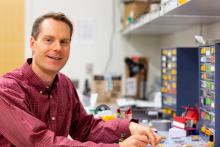Submitted by Diana Knight
on
Organic electrochemical transistors (OECTs) allow current to flow in devices like implantable biosensors. But scientists long knew about a quirk of OECTs that no one could explain: When an OECT is switched on, there is a lag before current reaches the desired operational level. When switched off, there is no lag. Current drops almost immediately.
A UW-led study has solved this lagging mystery, and in the process paved the way to custom-tailored OECTs for a growing list of applications in biosensing, brain-inspired computation and beyond.
Read the UW News press release on a paper published April 17, 2024 in Nature Materials by the group of Professor David Ginger and co-workers.
